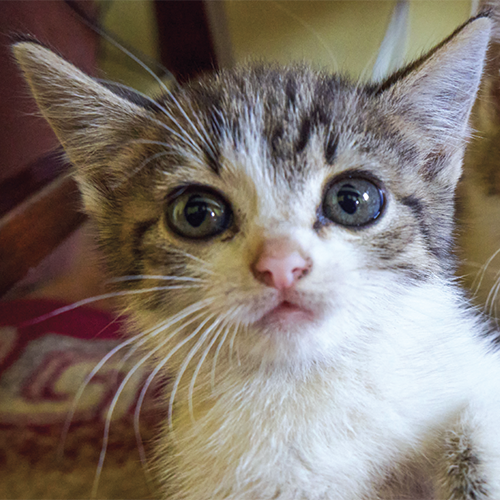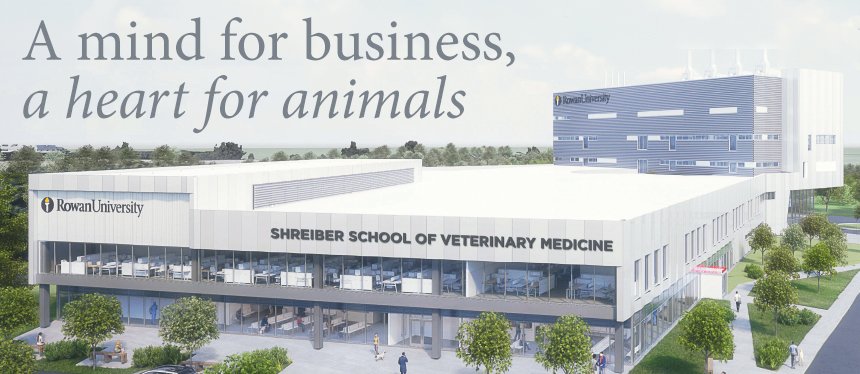A mind for business, a heart for animals
A mind for business, a heart for animals
Gerry Shreiber gives $30 million to New Jersey’s first veterinary school
by Barbara Baals
His extraordinary talent is rooted in business and entrepreneurship. But what’s closest to Gerald B. Shreiber’s heart? That’s easy.
“My heart is in providing opportunities for others to grow, particularly for people who work with and treat animals,” Shreiber said.
In April, Shreiber, put his generosity where his heart is when he pledged $30 million to Rowan University for the first veterinary school in the state of New Jersey. Rowan trustees named the school the Shreiber School of Veterinary Medicine, a fitting tribute to a business leader who built his phenomenally successful international company in New Jersey—and who has generously supported animal welfare and education for decades.
Gov. Phil Murphy and a host of state officials joined Rowan President Ali Houshmand, the University community, and future veterinary students in April to announce and celebrate Shreiber’s gift and to witness the groundbreaking of the new, 108,000-square-foot veterinary school on Rowan’s West Campus in Harrison Township.
The school is only the third veterinary school in the nation named for a benefactor. Pending accreditation approval, the Shreiber School is expected to welcome its first class of 60-70 students in 2025. Currently, there are 33 veterinary schools in the nation.
Shreiber’s humble beginnings—“very, very humble,” he emphasized—outside of Atlantic City generally focused on sandlot baseball and adopting stray animals. The son and grandson of produce salesmen, he regularly brought strays home.
“When I was growing up, the only opportunity I had for a dog was what I would find on the street. I would draw them into following me home and then lie to my mother that they followed me. I ran the neighborhood with my dogs. I’ve had animals all of my life,” said Shreiber, who lives on a 113-acre farm in Mullica Hill with his wife, Melanie, and numerous rescue animals, including dogs, horses, burros, goats and a cat.
As a young man, Shreiber knew becoming a veterinarian wasn’t for him. But business was. In 1971, he paid $72,100—“a very princely price,” he said with a grin—to purchase a bankrupt soft pretzel company. He transformed that company into J&J Snack Foods, Inc. of Pennsauken, an international brand in the multibillion-dollar snack food and beverage industry.
“My goal with the company was to rescue it. I thought I could fix it and grow it. And it turns out I was able to do all of those things,” he said.
J&J’s brands include SUPEPRETZEL, ICEE, Luigi’s and Minute Maid. The company today boasts nearly 4,600 employees and sales of more than $1 billion annually. J&J, which has plants across the nation and is the largest manufacturer of soft pretzels in the world, has been listed on the Forbes list of “200 Best Small Companies” seven times. Shreiber twice received the Ernst & Young Entrepreneur of the Year Award.
Committed to using his success for good, Shreiber was laser focused on generously supporting animal welfare. He created SAFE (Shreiber Animal Foundation Enterprise), which made a transformational gift to establish a pet therapy program at The Children’s Hospital of Philadelphia.
Named the South Jersey Humanitarian of the Year by the Animal Adoption Center in 2006, Shreiber, a longtime Rowan supporter who has endowed scholarships for business students, gave $3 million in 2019 to establish the Shreiber Family Pet Therapy Program. One of the most popular wellness initiatives at Rowan, the program brings certified therapy dogs to all campuses to provide wellness resources to students and employees.
The veterinary school gift was a natural progression, he said.
“Animals help all of us live richer, fuller, more active lives,” he said. “They have enriched my life tremendously.
I’m fortunate to be in a position where I can help a broader group of talented people pursue their passion to treat and serve animals.”
Shreiber’s gift will leave a lasting legacy, said Matthew Edson, DVM, founding dean of the Shreiber School. Dedicated to scholarships, the gift will provide support to help New Jersey veterinary students, who may then decide to remain in the state, Edson said.
The gift is the third-largest gift to the University (and the second-largest gift from an individual).
“This really is a capstone gift—and a game changer for our students. It will allow us to provide substantial, perpetual scholarship support for aspiring veterinarians for generations to come.
“Here in New Jersey, we have an unprecedented shortage of veterinary professionals,” Edson continued, noting that students from New Jersey currently have to go out of state to pursue their degrees and often don’t return. “If we keep these students in state, we can keep them as veterinarians later.”
The nation needs more veterinarians, according to Edson. The American Association of Veterinary Medical Colleges has predicted a shortage of 15,000 veterinarians in the nation within two decades. Additionally, Edson said, good health care for animals impacts everyone. Veterinary care includes caring for livestock and addressing zoonotic diseases—infections that are spread between people and animals.
“Veterinary medicine isn’t just about pets,” Edson said.
The veterinary school’s primary academic and clinical facilities will be adjacent to the South Jersey Technology Park, 1.5 miles from the Glassboro campus. The facilities will include classrooms and teaching laboratories; a teaching and referral hospital that will be open to the public for appointments; a clinical diagnostics laboratory; surgical instruction and continuing education facilities; administrative and faculty offices; and student support, library and study areas.
The teaching hospital, a rarity in most new veterinary schools, according to Edson, will provide core experiential learning to students, animal health care services to the public and special referral and diagnostic services to regional veterinary practices.
“Most of the newer programs don’t have an on-site referral hospital. We thought it was important to make sure that most of the clinical rotations—at least the core rotations—are in-house for us,” Edson said.
In addition to the DVM, the Shreiber School will offer graduate programs, including an MS/Ph.D. in veterinary biomedical science; an accelerated DVM/MBA in collaboration with the Rohrer College of Business; and an accelerated BS/DVM 3+4 pathway program in collaboration with the College of Science & Mathematics.
The school already has a number of collaborations with outside groups, according to Edson, who is the founder of Rancocas Veterinary Associates, a multi-doctor mixed animal practice.
The school works with Cedar Run Wildlife Refuge in Medford, the Marine Mammal Stranding Center in Brigantine, and the safari at Six Flags Great Adventure in Jackson, he said.
“Through these partnerships, we can cover any experience a student wants to have,” Edson said.
The Shreiber School is planning a Large Animal Field Service, which will provide high-quality veterinary care for animals such as horses, cows, alpacas, goats, sheep and pigs. The mobile unit will serve towns in seven counties within a 30-mile radius of Glassboro.
The need is great, Edson said, for large animal veterinarians in the state’s rural communities and the Large Animal Field Service will work to prepare more students to enter the field of large animal medicine.
In addition to the Rohrer College of Business and the College of Science & Mathematics, the Shreiber School is collaborating with the University’s Cooper Medical School, Virtua Health College, and even the College of Education.
“We are lucky at Rowan to have a lot of different departments that want to collaborate with us,” Edson said.
In the spring, Edson approached Studio 231, the student-led and student-run experiential learning lab and makerspace in the Rohrer College of Business.
His veterinary practice was treating Fortunato, a young Nigerian dwarf goat that needed prosthetic legs. The goat’s hind limbs were damaged due to septic arthritis, an infection. Edson challenged Studio 231 students to develop prosthetics that could give Fortunato—which means “fortunate” in Italian—a better quality of life.
Mechanical engineering students Addison Deckert and Vince Gallo, both lab techs in the studio, got right to work. Within three weeks, they used 3D imaging and resin printing in the Henry M. Rowan College of Engineering to make five different prototypes, ultimately producing breathable porous silicone socks that slip into royal blue prosthetic “feet” for Fortunato.
To the delight of his veterinarians and the Studio 231 team, Fortunato tested his new prosthetics by running—and throwing in a few joyful goat bounces for good measure—in the grassy area outside Business Hall.
“It was an amazing sight to see that he could actually run,” Deckert said. “We want him to have a happy goat life… doing goat things.”
“We all collaborated together to come up with a really good solution,” said Edson, who, as a child, developed a prosthetic leg for his pet duck.
Shreiber said he’s most eager to see the new school and celebrate its graduates, knowing that, because of his generosity, they’ll positively impact the health and welfare of the animals he treasures.
“I’m looking forward to that first class walking down the aisle,” said Shreiber, who accepted an honorary Doctor of Veterinary Medicine degree at Rowan’s Commencement in May.
“I’m delighted—and honored—to help make a difference in veterinary medical education. It’s the right thing to do.”

Serving shelter animals
As planning for the Shreiber School of Veterinary Medicine continues, the school already is serving animals and the people who care for them.
Through a partnership with Gloucester County, the school is supporting the Gloucester County Animal Shelter with spay/neuter services for pets awaiting adoption.
In August, Dr. Kirsten White, clinical assistant professor of shelter medicine at the Shreiber School, began providing spay and neuter services for dogs and cats housed at the shelter in Clayton.
Supporting the shelter upholds the Shreiber School’s mission to “collaborate with community partners to broaden the lens of education in veterinary medicine,” according to Founding Dean Matthew Edson.
As part of the school’s shelter medicine curriculum, veterinary students will receive training in
spay/neuter surgery, as well as shelter and community medicine. The training will help them to develop as compassionate and community- minded veterinary leaders, Edson noted.
Spaying and neutering pets helps combat overpopulation and protect against serious health conditions, according to Edson.
